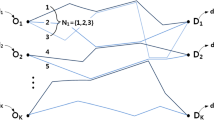Abstract
We employ the theory of Bayesian potential games to characterize pure-strategy equilibria of a Bayesian game with finite type structures, taking into account the cost/benefit features of agents. Building on a standard model of oligopolistic competition also applicable to environmental issues such as profit maximization in presence of an externality affecting all players, we rely on types to describe their heterogeneity. When the damage functions are additively separable, the potential provides necessary and sufficient conditions to ensure monotonicity of pure strategies.
Similar content being viewed by others
Notes
The technical similarities are shown in Monderer and Shapley (1996).
A partial order consists of a binary relation defined on a set indicating that, given two distinct elements in the set, one of them precedes the other. Such a relation is called a partial order to reflect the fact that not every pair of elements in the set need be related: in other words, there may exist a couple of elements such that none of them precedes the other. We will use a partial order on couples consisting of positive numbers and functions.
Given two sets \(X, Y,\) the notation \(X^Y\) indicates the set of functions from \(Y\) to \(X, X^Y =\left\{ f|f:Y\longrightarrow X\right\}\)
In the Examples in Sect. 4 such issue will be discussed after computing the equilibrium strategies.
References
Bahn O, Breton M, Sbragia L, Zaccour G (2009) Stability of international environmental agreements: an illustration with asymmetrical countries. Int Trans Oper Res 16:307–324
Balder E (1997) Remarks on Nash equilibria for games with additively coupled payoffs. Econ Theory 9:161–167
Branzei R, Mallozzi L, Tijs SH (2003) Supermodular games and potential games. J Math Econ 39(1):39–49
Breton M, Zaccour G, Zahaf M (2006) A game-theoretic formulation of joint implementation of environmental projects. Eur J Oper Res 168(1):221–239
Cartwright E, Wooders M (2009) On purification of equilibrium in Bayesian games and expost Nash equilibrium. Int J Game Theory 38:127–136
Einy E, Moreno D, Shitovitz B (2003) The value of public information in a Cournot duopoly. Games Econ Behav 44:272–285
Einy E, Haimanko O, Moreno D, Shitovitz B (2010) On the existence of Bayesian Cournot equilibrium. Games Econ Behav 68:77–94
Facchini G, van Megen F, Borm P, Tijs S (1997) Congestion models and weighted Bayesian potential games. Theory Decis 42(2):193–206
Filippiadis E (2011) Three essays on the environment, Doctoral dissertation, Concordia University
Germain M, Toint P, Tulkens H, Zeeuw AJ (2003) Transfer to sustain core-theoretic cooperation in tnternational stock pollutant control. J Econ Dyn Control 28(1):79–99
Germain M, Tulkens H, Magnus A (2010) Dynamic core-theoretic cooperation in a two-dimensional international environmental model. Math Soc Sci 59(2):208–226
Jørgensen S, Martín-Herrán G, Zaccour G (2010) Dynamic games in the economics and management of pollution. Environ Model Assess 15(6):433–467
Mallozzi L (2012) An application of optimization theory to the study of equilibria for games: a survey. Cent J Oper Res. doi:10.1007/s10100-012-0245-8
McAdams D (2003) Isotone equilibrium in games of incomplete information. Econometrica 71:1191–1214
Monderer D, Shapley LS (1996) Potential games. Games Econ Behav 14:124–143
Moulin H, Ray I, Gupta SS (2013) Coarse correlated equilibria in an abatement game. Department of Economics, University of Birminghma, Discussion Paper No. 13–11
Neyman A (1997) Correlated equilibrium and potential games. Int J Game Theory 26(2):223–227
Patrone F, Pusillo L, Tijs SH (2007) Multicriteria games and potentials. Top 15:138–145
Peleg B (1998) Almost all equilibria in dominant stratgies are coalition-proof. Econ Lett 60:157–162
Ray I, Gupta SS (2013) Coarse correlated equilibria in linear duopoly games. Int J Game Theory 42(2):541–562
Reny PJ (2011) On the existence of monotone pure-strategy equilibria in Bayesian games. Econometrica 79(2):499–553
Sandholm WH (2007) Pigouvian pricing and stochastic evolutionary implementation. J Econ Theory 132(1):367–382
Ui T (2009) Bayesian potentials and information structures: team decision problems revisited. Int J Game Theory 5(3):271–291
Van Zandt T, Vives X (2007) Monotone equilibria in Bayesian games with strategic complementarities. J Econ Theory 134:339–360
Voorneveld M (2000) Best-response potential games. Econ Lett 66(3):289–295
Acknowledgments
The authors would like to thank Raimondo Manca and an anonymous referee for very valuable comments and suggestions. The usual disclaimer applies.
Author information
Authors and Affiliations
Corresponding author
Rights and permissions
About this article
Cite this article
Palestini, A., Poggio, I. A Bayesian potential game to illustrate heterogeneity in cost/benefit characteristics. Int Rev Econ 62, 23–39 (2015). https://doi.org/10.1007/s12232-014-0221-9
Received:
Accepted:
Published:
Issue Date:
DOI: https://doi.org/10.1007/s12232-014-0221-9




